Kamala Harris 'keeps list of ENEMIES who don't fully understand her'

KAMALA Harris reportedly keeps a list of "enemy journalists and other politicians" who “don’t fully understand her,” according to a new report.
Both the Vice President and President Joe Biden have been criticized for the lack of access reporters have been given to question them, particularly after Harris was tapped to lead on the border crisis.
Yet Harris, 56, has still refused to take questions after events and allegedly keeps a list of words that she dislikes being described as by the press.
Her aides are warned to watch out for words such as cautious, careful, guarded, and hesitant.
In a profile in The Atlantic on Monday, it was reported that Harris views reporters’ attempts to question her as an “act of impish aggression.”
It also reported that she keeps a note of those who she believes “don’t fully understand her or appreciate her life experience.”
Among them is reportedly Washington Post reporter Chelsea James, who covered the 2020 election.
James, who generally works as a sports writer, is said to have gotten on the VP’s naughty list after she offended Harris with her description of her sorority’s trademark cheer, the “skee-wee.”
At an event for Harris’ book The Truth We Hold in 2019, James described the tradition as “screeches,” angering the VP.
The profile noted that Harris “retreats being talking points” when speaking in public and refuses interview requests.
It added that TV producers are second-guessing the money spent on sending reporters on trips with her as she comes across as “uninteresting” and produces “little usable material.”
Some have defended Harris’s reluctance to speak with the press, however, as they claim it is part of the “life experience.”
“There’s a reality of doing this work as a woman and a Black woman—and it often isn’t talked about a lot publicly—that there’s a presumed resilience around people who are first,” Kim Foxx, the first black woman elected state’s attorney in Cook County, Illinois, told The Atlantic.
“There is a celebration of what it means to break the ceiling and not nearly the conversation of what the cuts to your head look like.”
Harris has been consistently reluctant to speak to the press through the past 18 years straight she has spent as an elected official.
The Atlantic said that her new VP team has been surprised about the amount of work to be done when it comes to helping her improve her “sparring-with-journalists skills.”
It comes after years of “turf battles” in her office, it claims.
“Only a few senior aides on staff who have worked for her for more than a few months,” it writes.
“But her newest circle believes it is finally getting her on track after years of past staffers not serving her well.”
The latest silence from Harris comes as reporters remain uncertain of the role she is playing in battling the border crisis.
Republicans have demanded that she visit the border but she has so far failed to do so.
Since being named "border czar," the VP has traveled to states across the US but has not yet gone to the border.
Earlier this month, she defended sending $310million in aid to “corrupt” countries in an effort to compel migrants not to cross the US border.
Harris hammered home what she claims are the "acute" and "root" causes of the migration crisis – including the "lack of climate resilience".
She said that the funds are being sent to the Central America region of Guatemala, El Salvador, and Honduras as the administration wants "to help people find hope at home."
It comes on top of $4billion already earmarked by Biden in an attempt to address the migrant crisis at the US-Mexico border.
"We want to pick back up the kind of work President Joe Biden started when he was Vice President," Harris said.
"And so, we are focused on addressing both the acute factors and the root causes of migration. I believe this is an important distinction. We must focus on both.
"First, the acute factors. The catastrophes that are causing people to leave right now – the hurricanes, the pandemic, the drought, and extreme food insecurity," she added.
"And then there are the long-standing issues, the root causes. And I'm thinking of corruption, violence and poverty, the lack of economic opportunity, the lack of climate adaptation, and climate resilience, the lack of good governance."
Source: Read Full Article




